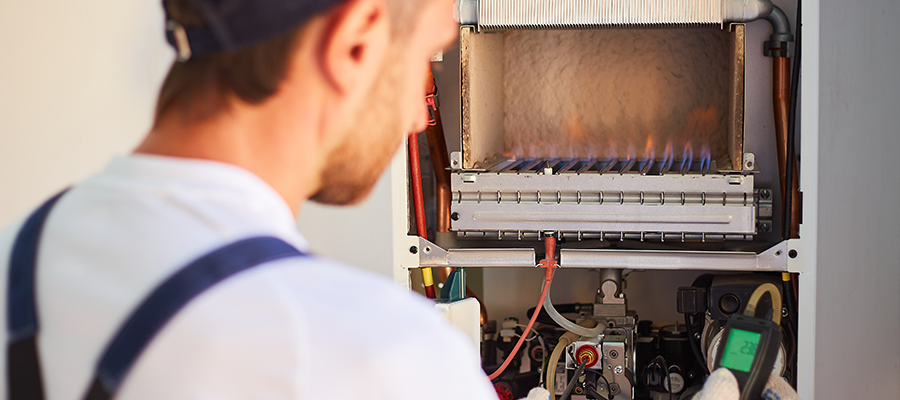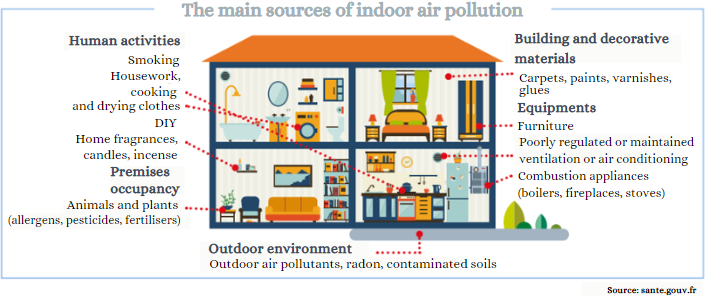Why maintain your heating appliance ?
If you own or rent a home fitted with one or more combustion heaters, it's compulsory to have them checked regularly by a qualified professional. It's not just a question of energy efficiency, it's also a question of health and safety.

Good maintenance = maintaining energy performance
It can't be repeated often enough: regular maintenance of domestic heating systems as a whole, i.e. appliance + flue, is absolutely essential to ensure optimum performance. It is compulsory for :
- wood, gas, oil-fired boilers, etc. (output between 4 and 400 kilowatts),
- independent heating appliances,
- heat pumps,
- ventilated heating appliances
Each visit is an opportunity to check, clean or replace any faulty parts, to fine-tune settings to optimise operation, or to remind you of certain good practices... In short, to make sure that everything is in order and that the appliance can be used in the best possible conditions.
Good maintenance = energy saving
Lack of maintenance can have an impact on the correct operation of the appliance, and therefore on its performance. A clogged flue, a damaged gasket, a faulty filter or fan, a blocked air inlet or outlet, etc., are all reasons that can affect the smooth operation of an appliance and therefore its performance.
According to the French Ministry for Ecological Transition, heating equipment that has not been serviced and/or is incorrectly adjusted can lead to excess energy consumption of between 8% and 12%.
Maintaining your installation properly is therefore also synonymous with energy efficiency.
Good maintenance = health and safety
The main purpose of these checks is to prevent the risk of carbon monoxide (CO) poisoning. Combustion appliances used for heating and hot water production can emit carbon monoxide if they are not properly maintained. Carbon monoxide is an invisible, odourless and non-irritating gas that can cause headaches, nausea and dizziness, and can even be fatal.
Carbon monoxide, two levels you must not cross.
Carbon monoxide is responsible for many cases of poisoning every year (around 1 300 accidents are reported to the health authorities every year), which is why this issue deserves special attention. During the inspection, the technician must measure the level of carbon monoxide in the ambient air:
- Concentration below 10 ppm (parts per million): nothing to report.
- Concentration between 10 ppm and 50 ppm: above the normal level. The professional must carry out further investigations into the chimney draught and ventilation of the dwelling.
- Concentration ≥ 50 ppm: warning! The professional must then stop the heating equipment until it is put back into service under normal operating conditions.
Differentiating a carbon monoxide detector from an automatic smoke detector.
Often similar in design, they can be confused. However, since 2016, one - the autonomous smoke alarm detector (ASAD) - has been compulsory in all homes, while the other - the carbon monoxide detector - is optional. Some models even combine the two functions.
In all cases, they work in a similar way: these small battery-operated boxes are fixed to the wall or ceiling, a few metres away from the appliance, and analyse the ambient air. If they detect too much gas or carbon monoxide, they ring to warn the occupants.
Good maintenance = less pollutants in the air
In addition to carbon monoxide emissions, other polluting substances can be emitted by combustion heaters, such as nitrogen oxides, particulates (a mixture of solid and/or liquid compounds suspended in the air) and other volatile organic compounds (VOCs).
Heating and cooking appliances are far from being the only equipment responsible for these emissions (see infographic below), but effective ventilation of the home combined with daily airing (10 minutes) will remove some of these pollutants from the indoor air, making it healthier.

Good maintenance = compensation in the event of an incident
While there are no legal penalties for users who fail to carry out the necessary annual maintenance, there is a risk that, in the event of a claim, the insurer will refuse to pay compensation, and that, in the case of a tenant, the cost of maintenance will be deducted from the security deposit.
The certificate after each operation
Every time a qualified professional carries out a check or service on a heating system, a certificate or service report should be issued. This document will not only provide a record of the work carried out (date, nature of maintenance, any comments made, etc.), but will also provide proof to an owner or insurance company that the equipment has been properly maintained.











